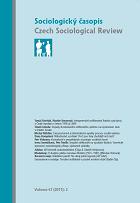Intergenerační vzdělanostní fluidita a její vývoj v České republice v letech 1990 až 2009
Intergenerational Educational Fluidity and Its Trends in the Czech Republic between 1990 and 2009
Author(s): Tomáš Katrňák, Natálie SimonováSubject(s): Social Sciences
Published by: AV ČR - Akademie věd České republiky - Sociologický ústav
Keywords: educational mobility; cohort analysis; educational inequality; educational research; measures of inequality
Summary/Abstract: The aim of the article is to identify the trend in educational fluidity in the Czech Republic between 1990 and 2009 and offer an explanation for it. The authors use a series of 28 annual surveys conducted between 1990 and 2009 in the Czech Republic and ascertaining information about the level of education of the respondent and the respondent’s father. The authors analyse trends in educational fluidity from a period and birth cohort perspective. The findings show that educational fluidity did not increase in Czech society between 1990 and 2003. From 2004 to 2009 this trend changed and a slight increase in educational fl uidity became evident. These changes in educational fluidity are driven by period (by institutional changes) rather than cohort effects (by cohort replacement). Period effect signifies both changes in the effect of class origin on educational attainment (class inequalities in education) and changes in the expansion of the Czech educational system. Both these period effects are presented as a part of the theory of maximally maintained inequality (MMI), which helps explain the changes in educational fluidity in the Czech Republic during the observed period.
Journal: Sociologický časopis / Czech Sociological Review
- Issue Year: 47/2011
- Issue No: 02
- Page Range: 207-242
- Page Count: 36
- Language: Czech

